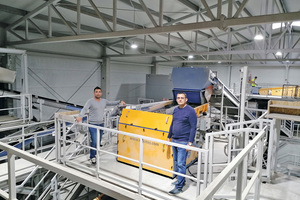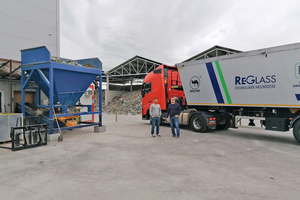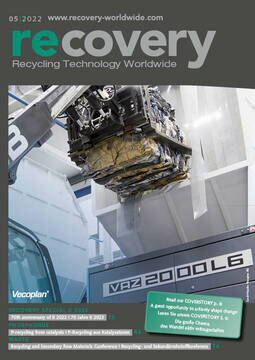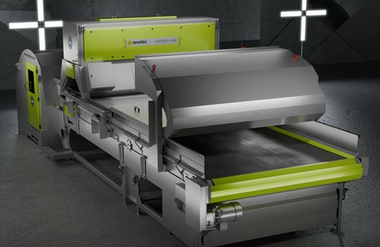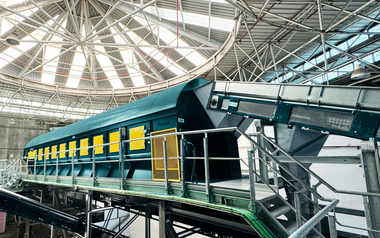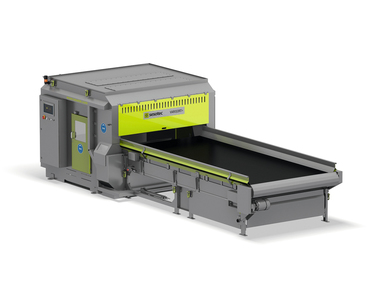Planned glass deposit system drives development in Hungary
Up until 2016 RE-GLASS Kft., with head office in Orosháza and other yards located in Budapest and Mezőörs, processed 7000 – 8000 t of flat glass per year, while bottle glass – because of the lack of modern technology – was only 1 – 3 t/a. As there is only flint glass production in Hungary, there was only a market for flint flat and packaging glass domestically. The collected and treated mixed packaging glass was exported as mix-glass.
In 2016 Mátyás Máthé became the new owner of RE-GLASS. He is assisted by Ferenc Aszódi as Managing director. The reason for this decision Hungary lags behind the EU-wide average and standards for collecting and recycling glass waste. The government of Hungary begun planning to introduce a deposit fee system in 2023 for packaging glass, which would ensure the satisfaction of EU expectations. This also would prevent this material flow from ending up in landfills.
Mátyás Máthé and Ferenc Aszódi explain: “These two pieces of information have induced us to embark on a major development that is going to be able to process the heavily contaminated glass waste from the current collection system. It will also be able to process the larger amount of cleaner glass waste generated by the deposit fee collection system.“
Sorting systems for recovering high-quality, pure glass materials
In 2018, Mátyás Máthé and Ferenc Aszódi visited IFAT in Munich. There, they met several suppliers of sorting technologies before choosing KRS GmbH, a partner company of Sesotec GmbH. In cooperation with KRS, RE-GLASS has now built the most modern plant in Hungary for sorting and processing bottle glass, capable of processing 8 – 10 t/h.
Foreign materials posed the biggest challenge to the new plant. Contaminants such as ceramics, stones, porcelain (CSP), metals, paper, and plastics comprise as much as 15 to 20 % of the total weight of all collected glass waste. To overcome this challenge, KRS supplied a sorting system that meets these requirements:
Four SPEKTRUM separation systems are connected in the line. They separate foreign materials such as magnetic and non-magnetic metals, CSP, non-transparent plastics, and special glass materials, and sort the mixed glass waste by color. The results are contaminant-free and color-pure streams of glass material.
The plant was commissioned in October 2019. Less than a year later in 2020, an additional 600 m2 hall was added to house new equipment. Surrounding the hall is an approximately 3500 m2 paved area with an 800 m2 covered and 600 m2 open storage area. Hungarian companies, in close cooperation with KRS, built the supporting structure of the halls, manufactured and installed the conveyor belts and the electrical wiring, and also built the PLC control system for the entire production plant.
A successful trial run took place in September 2020, during which KRS specialists set up the sorting units and installed the Sesotec VISUDESK software. With VISUDESK, it is possible to monitor the four SPEKTRUM sorters remotely, make fine adjustments, and track error messages. In this way, KRS can check settings and provide remote support if necessary.
Increased quantity, quality, and profitability
The technology provided by KRS and Sesotec makes it possible to produce high-quality recycled glass cullet that are the perfect product for reuse in the glass industry.
“Color sorting technology has helped us increase the amount of flint glass that we produce for the domestic market,” says RE-GLASS Owner, Mátyás Máthé. “At the same time, our mixed glass exports now contain a smaller proportion of flint glass. The processing quality and quantity have also increased. We hope that our government will introduce a deposit system as announced. With a new deposit system in place, we can continue to successfully operate in three shifts, or even begin to operate continuously using the equipment supplied to us by KRS.”
“Our latest technology line selects all foreign materials (magnetizable and non-magnetizable metals, individual paper and plastic waste); four optical sorters are built one behind the other to ensure that ceramics and wire glass are also taken out of the glass waste. Therefore, a completely contamination-free glass product is obtained. Additionally, we sort mixed glass waste collected by us or our partners by color. Above all these, according to the demands of our customers, we are able to set the color selection rate with an accuracy of 1 – 2 %. One of our Hungarian partners produces glass foam from 0 – 6 mm glass cullet. So you can say that the glass waste we process continues its life as a 100 % glass product. The circular economy is a reality, and RE-GLASS is making a big contribution here,“ adds RE-GLASS Managing Director Ferenc Aszódi.

